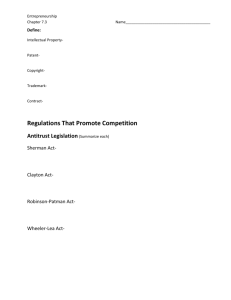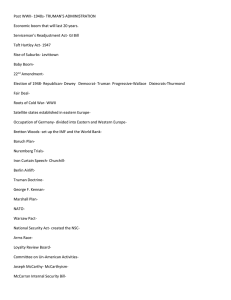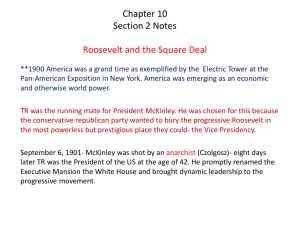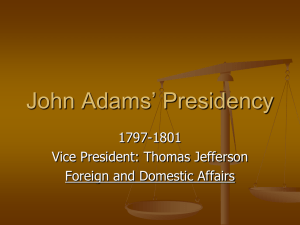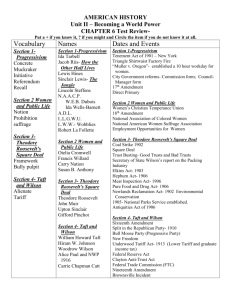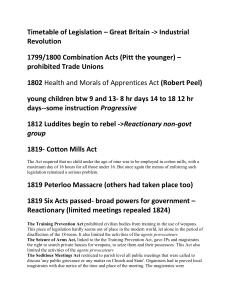Acts and Ammendments
advertisement
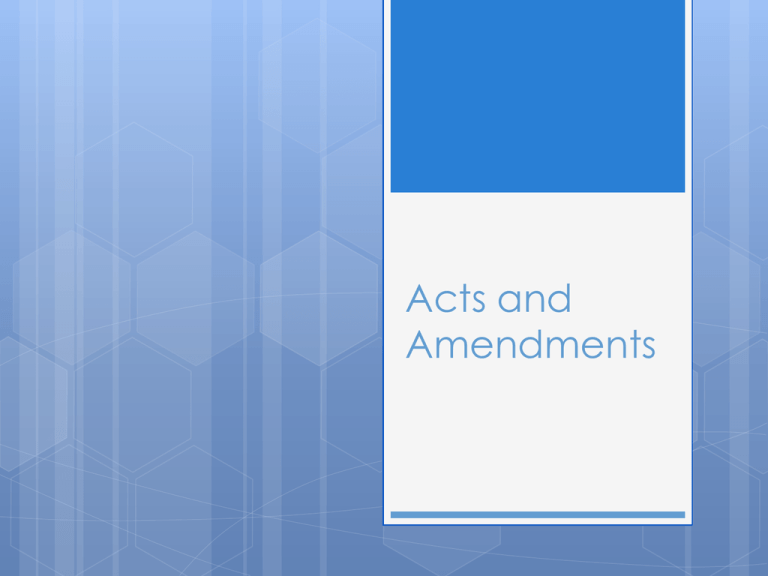
Acts and Amendments Pre-constitution Navigation act- 1651-mercantilism!!! Colonial products only go to England- $ to England not Colonies Sugar Act- 1764- first law b parliament to raise $ for Crown- tighter custom laws in colonies Stamp Act- 1765- raise $ for British troops, NO TAXATATION WITHOUT REPESENTAION Showed: colonists were entitled to rights and privileges Used violence not legal means British believed colonies had no right Coercive Acts/Intolerable 1774- British response to Tea Party, closed port of Boston to reduce self government in Mass. Colony Requirement of quartering troops Revolution to Civil War Kansas Nebraska Act- 1854- repealed Missouri Compromise Applied popular sovereignty to territories Permitted expansion beyond southern states (went against Wilmot Proviso) Sparked formation of Republican party Radical Republicans 13th Amendment- abolish slaver 14th –Equal protection under law and citizenship Brown vs. Board Plessey vs. Ferguson 15th Amendment voting rights for African American men Western expansion Homestead Act- 1862- encourage settlement in west- 160 acres free for cultivating in 5yrs Chinese exclusion act- 1882- first law to exclude a group from America based on ethnicity anti-immigration sentiment in west Dawes Act 1887- divided Native American tribal lands into individual homesteads To assimilate into American culture Forced civilization views, it destroyed tribes and wiped out their ownership of land and culture Progressivism Sherman Anti-Trust act- 1890- forbade unreasonable combinations or contracts in restraint of trade- little impact on large corps. Pure food and Drug Act 1906 Prompted by The Jungle – muckrakers, list contents on product- meat inspection act Federal Reserve Act- 1913- create Federal Reserve Board, established national system, made currency and credit more elastic National Origins Act-1924- restrict south and eastern Europeans (Catholic and Jewish)- also known as the Quota system, significantly decrease the #s coming in to the US. Amendments 16th- Income taxes (Wilson lowers tariffs) 17th Direct election of Senators Robert Lafollette- give people voice in politics, work against corrupt city bosses Initiative, Referendum and recall 18th Amendment – prohibition (21st repealed) 19th Women’s right to vote 20th Terms in office Great Depression/New Deal National Industrial Recovery ACT-1933 (Hoover) Foster government-business cooperation Businesses to regulate themselves through codes of fair competition- did not succeed Social Secruty-1935- federal pension funded by taxes- aging of Americans threatens system Wagner Act-1935 – a.k.a.- National Labor Relations Act, a.k.a. magna carta of labor, it ensured workers the right to organize and barging collectively Rapid rise in labor union membership WWII Neutrality acts- commitment to isolationism after WWI, drew support form Washington's Farewell Address Cash and Carry Lend Lease 1941- provide supplies to allies, help GB resist Nazi Germany Civil Rights Civil Rights act of 1964- outlawed segregation Voting rights act- outlawed poll taxes, literacy tests and the grandfather clause 24th amendment abolition of poll taxes Post WWII Taft-Hartley 1947- curb power of unions, believed unions were abusing powers and would endanger national defense industries- cold war era Federal Highway Act 1956- crated interstate highway system- key in promoting suburban growth. US immigration and nationality act of 1965- abolished the 1920s quota system
